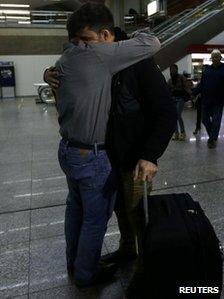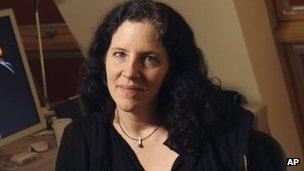David Miranda detention legally sound, says Scotland Yard
- Published

Glenn Greenwald greeted Mr Miranda when he arrived in Brazil on Monday
Using the Terrorism Act to detain the partner of a Guardian reporter who covered US and UK security services was "legally sound", Scotland Yard says.
It was responding to claims it misused its powers by holding David Miranda for nine hours at Heathrow on Sunday.
The UK's reviewer of terror laws has said the length of detention was "unusual" and will meet police later.
Meanwhile, the Guardian's editor claims leaked information it held was destroyed following government demands.
Government sources told the BBC in response to the editor, Alan Rusbridger's claims that the official approach had not been "heavy-handed".
No-one had been arrested, no injunctions sought and the newspaper still continued to print stories based on the leaked material, the sources said.
'Procedurally sound'
The independent reviewer of terrorism legislation, David Anderson QC, will meet police for an urgent briefing on the matter.
He and senior British politicians have called on police to explain why Mr Miranda, 28, was detained.
The Brazilian was held at Heathrow on his way from Berlin to Rio de Janeiro - where he lives with his partner, Guardian journalist Glenn Greenwald, who has published information from US whistleblower Edward Snowden.
He was detained under schedule 7 of the Terrorism Act 2000. This allows police to hold someone at an airport, port or international rail station for up to nine hours for questioning about whether they have been involved with acts of terrorism.
David Miranda: "I was kept in a room with six agents... asking me about everything. My whole life"
Mr Miranda said he was kept in a room and questioned about his "whole life".
Scotland Yard, which has not revealed on what grounds he was detained, said in a statement on Monday night that the "examination" of Mr Miranda was "subject to a detailed decision-making process".
"The procedure was reviewed throughout to ensure the examination was both necessary and proportionate," it added.
"Our assessment is that the use of the power in this case was legally and procedurally sound.
"Contrary to some reports, the man was offered legal representation while under examination and a solicitor attended.
"No complaint has been received by the MPS at this time."
In Germany, Mr Miranda had been staying with US film-maker Laura Poitras, who has also been working on the Snowden files with Mr Greenwald and the Guardian, according to the newspaper.
The paper said Mr Miranda was stopped while he was "ferrying materials" between his partner and Ms Poitras.

David Miranda had visited documentary film-maker Laura Poitras in Berlin
"I was kept in a room with six agents coming in and out and asking me about everything - my whole life," Mr Miranda told reporters when he arrived back in Brazil on Monday.
"They took my computer, my video games, my mobile phone and memory cards - everything."
'Heads up'
In a separate interview with the Guardian, external, he said: "They were threatening me all the time and saying I would be put in jail if I didn't co-operate.
"They treated me like I was a criminal or someone about to attack the UK... it was exhausting and frustrating, but I knew I wasn't doing anything wrong."
He said he had to tell them the passwords to his computer and mobile phone.
"They said I was obliged to answer all their questions and used the words 'prison' and 'station' all the time," he added.
The US government has said British officials gave it a "heads up" about Mr Miranda's detention but said the decision to seize him was a British one taken "independent of our direction".
Brazil's foreign minister Antonio Patriota has called the detention "not justifiable" and has sought answers from his UK counterpart, William Hague.
Downing Street has said the case is an "operational matter for the police".
Mr Greenwald said the British authorities' actions amounted to "bullying" and linked it to his writing about Mr Snowden's revelations concerning the US National Security Agency (NSA).
Mr Snowden, who has been granted temporary asylum in Russia, leaked details of extensive internet and phone surveillance by American intelligence services.
According to the Guardian, he passed "thousands of files" to Mr Greenwald, who has written a series of stories about surveillance by US and UK authorities.
Mr Greenwald said his partner's detention was "clearly intended to send a message of intimidation to those of us who have been reporting on the NSA and [UK intelligence agency] GCHQ".
'Shadowy figures'
While the detention has been widely criticised, others have spoken out in support of it.
Former Conservative MP Louise Mensch said Mr Greenwald had admitted that Mr Miranda was carrying "classified, stolen intelligence data encrypted on hard-drives".
"He wasn't stopped because he was somebody's husband and he wasn't stopped because he was a journalist," she told the BBC.
Labour's former home secretary David Blunkett said "we should try and get to the facts".
"Was it right to use terrorism legislation? Was it right to stop and search and find out if he was carrying data, illicitly obtained, which would be dangerous to the British nation? I don't think we should get hysterical one way or the other," he said.
Guardian editor Alan Rusbridger has written an article about Mr Miranda's detention and what it means for journalism, external
He also talks about how he was contacted by a "very senior government official claiming to represent the views of the prime minister" who demanded the return or destruction of the Snowden files.
Mr Rusbridger said that after two months of meetings and the threat of court action, two security experts from GCHQ, the UK's eavesdropping centre, came to the Guardian's offices to oversee the destruction of computer hard-drives.
He said the security experts oversaw the destruction "just to make sure there was nothing in the mangled bits of metal which could possibly be of any interest to passing Chinese agents".
"Whitehall was satisfied, but it felt like a peculiarly pointless piece of symbolism that understood nothing about the digital age," he said.
"We will continue to do patient, painstaking reporting on the Snowden documents, we just won't do it in London."
A government sources told the BBC the authorities had not "acted like thugs" and had been trying to ensure the material did not fall into the wrong hands.
- Published19 August 2013
- Published19 August 2013
- Published16 December 2013